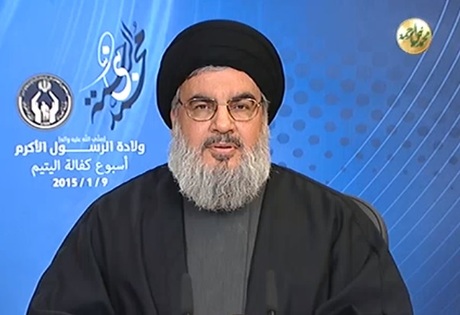
Lebanon Cabinet condemns Qunaitra strike
Hasan Lakkis/The Daily Star/Jan. 22, 2015
BEIRUT: Lebanon’s government condemned Thursday the Israeli strike on Syria’s Golan Heights which left six Hezbollah fighters dead, with ministers describing talks over the matter as calm and civilized. The government blasted the Israeli aggression on the Syrian town of Qunaitra which killed six Lebanese, Information Minister Ramzi Joreige said after the session, which was chaired by Prime Minister Tammam Salam at the Grand Serail. Speaking at the outset of the session, Salam said that the government had to “contain the repercussions of developments in the region,” in reference to Qunaitra’s attack, “and go ahead with addressing people’s needs and implementing security plans in the country.” The March 14 coalition called on Hezbollah to avoid dragging Lebanon into a new war with Israel through its possible retaliation to the Sunday strike. Tourism Minister Michel Pharoun, from the Future bloc, said after the Cabinet session that the atmosphere during the meeting was “consensual.”He said that his colleague in the March 14 coalition, Telecoms Minister Boutros Harb, raised the issue of the Qunaitra strike during the session. Commenting on the matter, Hezbollah Minister of State for Parliamentary Affairs Mohammad Fneish said that while his party cared about the country’s interests, it won’t allow Israel to persist in its aggression. Justice Minister Ashraf Rifi said that discussions over the Qunaitra strike were “patriotic and civilized.”
“There are no two stances from the Israeli aggression, we are against any aggression targeting Lebanon or any Arab state,” Rifi said. Lebanese Forces Labor Minister Sejaan Azzi said the best way to respond to the Israeli strike would be through “respecting U.N. Security Council Resolution 1701, bolstering government work, electing a new president and going ahead with the implementation of the security plan.” Fneish described the stances of ministers during the session as “excellent.
”The government said that any statement made by any political party in Lebanon reflected the group’s stance only, adding that positions taken by the government were the only ones reflecting those of the state. This stance comes after remarks made by Hezbollah Secretary General Sayyed Hasan Nasrallah two weeks ago criticizing Bahrain over its Dec. 28 arrest of Sheikh Ali Salman, a leading figure in the Bahraini opposition. Hezbollah’s opponents feared that Nasrallah’s remarks threatened to spark a diplomatic crisis between Lebanon and Bahrain and negatively affect the Lebanese community living in the small island kingdom.
The government made several decisions including the approval of a loan of $30 million to the Council of Development and Reconstruction to build prisons, and another loan to the Higher Relief Committee to compensate for damages inflicted on Arsal during the August clashes between the Army and jihadi groups. The Cabinet also approved funds for the construction of a highway linking the southern city of Tyre to the border village of Naqoura. Pharaon and ministers allied to the Free Patriotic Movement leader Michel Aoun expressed their reservations over the decision to construct the highway.
Nasrallah free to speak his mind: Lebanon PM
The Daily Star/22.01.15
BEIRUT: Lebanon’s political officials are free to comment on regional events as they please, but that does not mean they reflect official government positions, Prime Minister Tammam Salam said, distancing himself from the Hezbollah chief’s recent remarks on Bahrain. “Whatever the secretary general of Hezbollah Sayyed Hasan Nasrallah declares is his own business,” Salam said in an interview with Qatari daily Al-Watan published Thursday. “As a government, we would announce our position openly and officially, but political forces represented in the Cabinet have their own political platforms which they use to air their views on many sensitive issues in Lebanon’s space of free speech and democracy,” Salam said. “As the prime minister of Lebanon I will never hesitate to voice official stances bluntly and openly and abide by them,” he said. “But I am not in a position to monitor and sanction what political forces in the country say or to deter them and stop them from speaking out,” he added. In a televised speech two weeks ago, Nasrallah denounced Bahrain’s crackdown on its protest movement and Dec. 28 arrest of its main opposition leader, Sheikh Ali Salman, head of the al-Wefaq Islamic Society.
Nasrallah’s accusations against the island kingdom outraged Gulf Cooperation Council (GCC) countries, some of which had summoned Lebanese diplomats to lodge an official complaint. Commenting on Israel’s deadly attack on Syria’s Golan Heights town of Quneitra in which six Hezbollah fighters were killed Sunday, Salam said he hoped there will be no repercussions on Lebanon in such a difficult situation. “We will continue to seek the implementation of the policy of disassociating Lebanon from the events in Syria.
This policy was endorsed in the government’s policy statement but there are still discrepancies between theory and application on the ground,” Salam said. While Hezbollah has remained tightlipped on possible response to the deadly attack, the Lebanese government is seeking to avert any negative repercussions from a Hezbollah retaliation that would impact the internal situation in Lebanon and the position of the government as a whole.




















